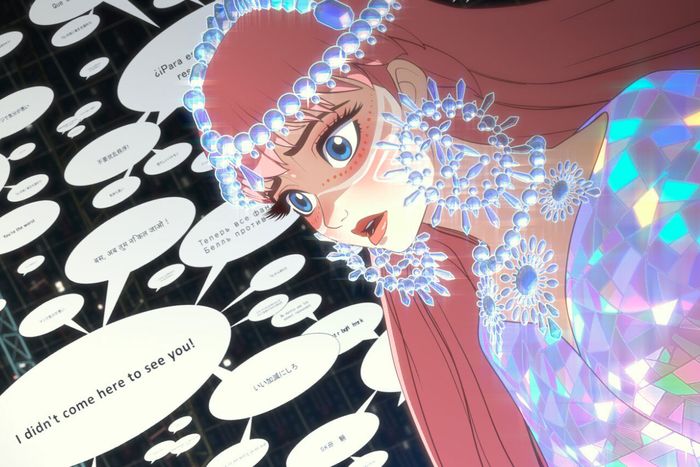
The metaverse has arrived in Belle, and it’s a spectacular sanctuary five billion users strong and thrumming with endless possibility — as well as with all the resentment, shame, obsession, and commercialization that might send someone fleeing from the real world in the first place. Movies tend to reflexively treat online immersion as the stuff of a cautionary tale, but Mamoru Hosoda’s latest is more clear-eyed about the internet being just another home for human messiness. “You can’t start over in reality, but you can start over in U,” a voice-over promises at the outset of Belle, as the film spirals through a dizzying digital landscape to find its heroine belting out a song from the back of a speaker-adorned whale gliding through cyberspace. But while the film’s characters are able to reinvent themselves as virtual pop stars and glowering creatures, their problems still have a way of bleeding through. With the Dragon, the mysterious and violent figure that Suzu (Kaho Nakamura) becomes obsessed with, that bleed is literal. The bright patterns on his back turn out to correspond with bruises on the body of the person controlling it.
Belle is Hosoda’s eighth feature and the one that feels like the most coherent blend of the various universes he’s straddled as an animator. He came up worshiping Miyazaki (who among us) but working on Digimon, and when he was finally offered a job with Miyazaki’s Studio Ghibli — he was originally supposed to direct Howl’s Moving Castle — his sensibility didn’t mesh with the house style. Hosoda is prone to exuberant flights of fancy, which extend from casual instances of time travel to magical beasts, but he’s also had a persistent interest in rendering virtual worlds onscreen going back to his Toei days. A 2000 short he made about a rogue Digimon that hacks the Pentagon and launches a ballistic missile at Japan became the inspiration for his 2009 feature Summer Wars, a compelling mutant creation in which a group of teens, with an assist from a well-connected aristocratic family, try to stop an AI intent on bringing about a cheery digital apocalypse. The breathtaking Belle is an explicit attempt to wed the fairy tale with the high tech, retelling Beauty and the Beast by way of social media. But as is often the case with Hosoda, it’s the extracurricular details that make his work so moving, the textures of the everyday lives of his characters that become something larger and more profound when placed in contrast to the genre elements at the center of his story.
Suzu, for instance, may be a celebrity in U, but outside of it she’s a nondescript teenager who’s largely invisible at her school aside from her friendship with the acerbic Hiro (Lilas Ikuta) and the occasional protective gesture from Shinobu (Ryō Narita), a childhood friend who’s grown up to be a heartthrob. The film wordlessly sums up her dying rural community with a montage of her morning commute through empty train stations and quiet bus routes that signs announce are on the verge of being discontinued. When she was young, she witnessed her mother’s death, a memory presented like a totem that she can’t help but haul out and consider whenever she has a quiet moment. Her mother waded into a flooding river and drowned in the process of rescuing a stranded kid, and Suzu has trouble seeing past her own sense of abandonment to glimpse the bravery of this act. This tragedy silenced Suzu, who learned to love music from her mother and found herself unable to sing after her death. It’s only in U, shielded by anonymity and a princess-style avatar with rose-gold hair, that Suzu can free her voice. The pleasant but muted tones of the real world contrast with the overwhelming busyness of U, where the lack of gravity and boundless space allows for a concert venue in the shape of a hollow planet and for crumbling gothic castles as personal hideouts.
U serves as an escape, but Belle keeps drawing parallels between the behavior of people around Suzu and that of the avatars in this supposed digital paradise. When the Dragon interrupts one of Belle’s concerts, he becomes the target of U’s self-appointed police force, whose ultimate weapon is doxing. When Suzu’s suspected of having some kind of romantic entanglement with Shinobu, she barely avoids becoming the target of group-chat gossip deeming her unworthy of such a pairing. Group cruelty, self-righteousness masquerading as justice, and reinforced social strata are as much factors in the fable that inspired Belle as they are in social media, age-old patterns revisited in new digital forms. While Hosoda presents a lot of spectacular imagery, his film’s high point is one that blends its online fantasy world with the mundane real one in a startlingly poignant moment that emphasizes the ways that everything and nothing has changed as humanity keeps moving forward. The metaverse is just the latest means of hiding our most vulnerable parts from the world, and being seen for who we are remains a real act of daring.
More Movie Reviews
- The Accountant 2 Can Not Be Taken Seriously
- Another Simple Favor Is So Fun, Until It Gets So Dumb
- Errol Morris Has Been Sucked Into the Gaping Maw of True Crime


